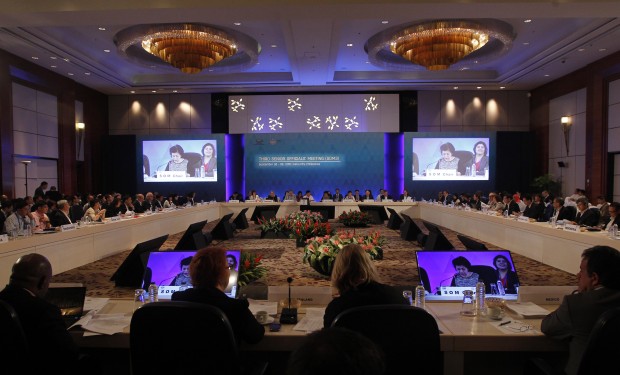
Officials of the 21-member economies of the Asia-Pacific Economic Cooperation meet in Cebu to discuss integration and modernization of financial markets in the region. Photo from APEC 2015 Media Operations Committee
Business leaders across the 21 economies belonging to the Asia-Pacific Economic Cooperation (Apec) have supported the Philippines’ proposed Cebu Action Plan aimed at integrating the region’s financial sector while enhancing resiliency, fiscal transparency and infrastructure development.
In an Aug. 20 letter to Philippine Finance Secretary Cesar V. Purisima, who chairs the Finance Ministers’ Process this year, Apec Business Advisory Council (Abac) 2015 chair Doris Magsaysay-Ho said the group “welcomes the finance ministers’ decision to launch the Cebu Action Plan to provide a road map” to reform the region’s financial systems.
The four-pillared Cebu Action Plan, the drafting of which was spearheaded by this year’s host-economy, will be up for approval by Apec finance leaders when they meet in Cebu on Sept. 10-11.
Ho said Abac supported the following particular initiatives being proposed under the Cebu Action Plan:
- Establishment of a public-private Financial Infrastructure Development Network to help build credit information systems and improve policy frameworks for secured transactions and the use of movable assets as collateral;
- Use of the Asia-Pacific Forum on Financial Inclusion as a platform for sharing experiences on policy innovations to promote financial inclusion and literacy;
- Use of the Asia-Pacific Financial Forum (APFF) as a platform for a network of experts from the public and private sectors and multilateral organizations to help expand the coverage of microinsurance in member-economies;
- Harnessing the APFF in building a network of public and private sector experts who can collaborate to develop sound financial and insurance markets to secure public trust in disaster risk financing products, improve disaster risk evaluation, and raise public awareness of disaster risk, and
- Using the APFF as a platform for improving capital market depth and liquidity in the region.
Abac also recommended the inclusion of the following proposals in the Cebu Action Plan:
- Initiatives to accelerate the development of a pipeline of bankable infrastructure projects through collaboration among the Apec Public-Private Partnership (PPP) Experts Advisory Panel, the Asia-Pacific Infrastructure Partnership, the Global Infrastructure Hub and the Urban Infrastructure Network;
- Tasking the Apec PPP Experts Advisory Panel to identify best practices in establishing private funds for equity investment in infrastructure involving public-private collaboration, as well as standards, policies, regulations and practices that impact the appetite of insurers and pension funds for investing in long-term infrastructure projects;
- Promoting an enabling legal and regulatory environment and capacity building to accelerate the development of repo and derivatives markets, improve availability of relevant information needed by capital market investors, and develop financial market infrastructure and practices to facilitate cross-border portfolio investments in order to develop and integrate capital markets.
- Inclusion of regional public-private sector dialogues using APFF as a platform to facilitate early enlargement of the Asia Region Funds Passport initiative to include a critical mass of participating jurisdictions, and
- Broad collaboration across the Apec fora on cross-cutting initiatives that impact the financial sector.
“We suggest that finance ministers support the efforts of the Regional Investment Analytical Group in developing indicators to help enhance investment flows in the region, as well as Abac’s collaboration with the International Valuation Standards Council to improve valuation practices across Apec economies,” Ho added.

